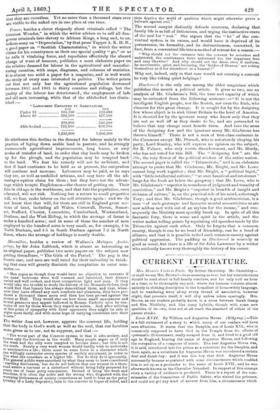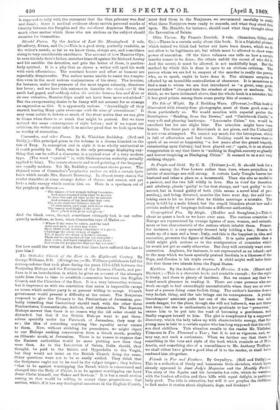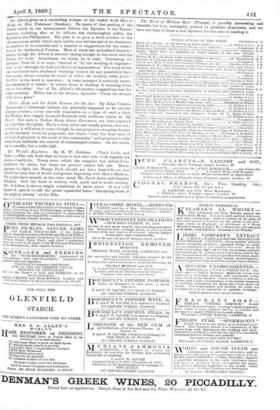CURRENT LITERATURE.
Mrs. Brown's Visits to Paris. By Arthur Sketchley. Mr. Sketohleyor shall we say Mrs. Brown T—is as amusing as ever, but her reminiscences should bo read aloud in full family conclave, and for only half an hour at a time, to be thoroughly enjoyed ; whore the humour consists almost entirely in clothing description in the homeliest of housewifely language, and in wandering away along every thread of association, however alight, that presents itself, it will cloy unless taken sparingly. Mrs. Brown, as our readers probably know, is a cross between Sarah Clamp and Mrs. Nickleby, and, like many hybrids, though with some new qualities of its own, does not at all reach the standard of either of the parent stocks.
Louis XVII. By William and Augustus Moves. (Ridgway.)—This is a full statement of a story to which many of our readers will have seen allusions. It states that the Dauphin, son of Louis XVL, who is commonly supposed to have died in the Temple from the effects of systematic ill-treatment, really escaped from it, and lived to a good old age in England, bearing the name of Augustus Moves, and following the occupation of a composer of music. The real Augustus Moves was, it is said, introduced into the prison as a substitute for the Dauphin, and then, again, as a substitute for Augustus Moves was introduced • certain deaf and dumb boy ; and it was this boy that died. Augustus Moves necessarily became acquainted with some circumstances which enabled him to set up as a pretender to the name of Louis XVII., and he was afterwards known as the Chevalier Neundorf. In support of this strange story a variety of evidence is produced. There is a report of the commissaries of the Committee of Public Safety, who visited the prisoner, and could not get any kind of answer from him, a circumstance which is supposed to tally with the statement that the then prisoner was deaf arid dumb ; there is medical evidence about certain personal marks of identity between the Dauphin and the soi-disant Augustus Moves, and mach other matter which those who are curious on the subject should examine for themselves.
Blonde! Parva. By the Author of Lost Sir Massingberd. 2 vols. (Bradbury, Evans, and Co.)—This is a good story, perfectly readable, as the writer's novels, so far as we know them, always are, and sometimes rising to very considerable excellence. The account of how Maurice Glyn, to save his lady-love's father, matches himself against Sir Richard Anstey and his satellite the detective, and gets the better of them, is particularly spirited. It is a pity that so clover a writer will spoil his work with such affectations. The constant banter and effort at humour are especially disagreeable. The author seems unable to resist the temptation oven in the most serious conjunctures of his story. The heroine, for instance, under the pressure of the most urgent calamity, dismisses her lover ; and we have this sentence to describe the shock :—" If the earth had gaped, and suddenly taken the articles between hint and Kate at its own valuation, Maurice Glyn could not have boon more astonished." But the overpowering desire to be funny will not account for so strange an expression as this. It is apparently serious. "Accordingly off they started, leaving Mary quite overcome with the wine of astonishment." It may seem unfair to devote so much of the short notice that we can give to blame when there is so much that might be praised. But we have noticed the same extravagance of style before ; and if we repeat our criticism, the writer must take it as another proof that we look upon him as worthy of correction.
Cassandra, and other Poems. By It. Whieldon Baddeley. (Bell and Daldy.)—The principal poem in the volume is a drama founded on the tale of Troy. In conception and in style it is as wholly unclassical as it could possibly be. Paris, who is the only personage displaying anything that can be called a character, is a cynical roue of a very modern typo. (The word " cynical " is, with Shakespearian audacity, actually applied to him). The ornate rhetoric and word-painting of the language aro equally modern. Yet Mr. Baddeley sometimes shows power. The rhymed verse of Cassandra's"prophocies rushes on with a certain lyric force which recalls Mrs. Barrett Browning. In almost every stanza the reader stumbles at some strange defect of rhyme and reason, and yet feel.' a rude energy which carries him on. Hero is a specimen out of the prophecy on Greece :— " The names of her nymph-hiding fountains,
And muse-haunted hills shall be known To men through all time as the mountains And streams of the land that they own. The souls shall her fullness inherit Of statesman, and sage, and those whom The beauty and blight of the spirit
Have gifted with glory and gloom."
And the blank verse, though sometimes strangely bad, is not unfrequently melodious, as here, when Cassandra says of Hades :—
Where if the wave be sullen, and the land And and dark, nor over any voice,
Save shrill weak wailing sometimes of a ghost, Challenge the silent victory of night ; Yet, If maybe we drink of Lethe's stream, There are no memories of lost joy and pride; And, cones, red-hand slaughter is not there, Nor scorn for prophecies that are but too true."
Yet how could the writer of the first four lines have suffered the last to pass him ?
The Orthodox Church of the East in the Eighteenth Century. By George Williams, B.D. (Rivingtons.)—Mr. Williams publishes in full the correspondence that took place during the years 1716-1725 between the Nonjuring Bishops and the Patriarchs of the Eastern Church, and prefixes to it an introduction, in which he gives an account of the attempts made from time to time to establish communion between the English Church and the Churches of the East. It is a very interesting volume, but it impresses us with the conviction that union is impossible except on terms which neither party is at present willing to accept. Church government would present a difficulty at the outset. The Nonjurors proposed to give the Primacy to the Patriarchate of Jerusalem, probably intending that Canterbury should rank with the other three Patriarchates, Constantinople, Antioch, and Alexandria. The Eastern Bishops answer that there is no reason why the old order should be disturbed, but that if the British Bishops want to put themselves specially under the Patriarch of Jerusalem, they may do so ; the idea of conceding anything like equality never occurs to them. Now, without stickling for precedence, we might object to our Bishops seeking consecration from a Greek monk, possibly an illiterate monk, at Jerusalem. There is no reason to suppose that the Eastern authorities would be more yielding now than they were then. As to the Invocation of Sainte, Delia should, they thought, be paid to the Saints, and Hyperdnlia to the Virgin, but they would not insist on the British Church doing the same. Other questions were not to be so easily settled. They think that the Scriptures ought not to be read in the vulgar tongue; they believe "that to be against worshipping the Broad. which is consecrated and changed into the Body of Christ, is to be against worshipping our Lord Jesus Christ himself, our Maker and Saviour." It is but a small section among us that would be willing to accept these propositions; that section, which, if it has any theological ancestors in the English Church, must find them in the Nonjurors, we recommend carefully to study what these Nonjurors were ready to concede, and what they stood firm upon. Mr. Humble, for instance, should read what they thought about the Invocation of Saints.
Olive Varcoe. By Francis Derrick. 3 vols. (Saunders, Otley, sad Co.)—There is a certain unity about this book. It is a frightful picture, which indeed we think had bettor not have been drawn, which we do not allow to be legitimate art, but which must be allowed to show some power of execution. Of the three volumes one tells us how a certain murder comes to be done ; the others unfold the secret of who did it. And the secret, it must be allowed, is not unskilfully kept. But the method by which this is done is open to an obvious criticism. The person whom we are led to suspect of the murder is really the person who, so to speak, ought to have done it. The ultimate surprise is effected by an incredible contradiction of character. It is monstrous to find a man to whom we are first introduced as "a great, easy, good_ natured fellow" changed into the cruelest of savages or madmen. We think, as we have intimated above, that the whole book is a mistake; bat it has good points, among them some pretty bits of scenery.
The Isle of Wig/it. By J. Redding Ware. (Provost.)—This book is illustrated with twenty-four photographs, most of them good, some of them particularly so. We would mention with especial praise the frontispiece " Brading, from the Downs," and " Carisbrook Castle," very soft and pleasing landscape. "Luccombe Chine," too, would be excellent but for one slight blur. The selection might have been better. The finest part of Bonchurch is not given, and the Undercliff is not oven attempted. We cannot say much for the letterpress, which is full of affectation and bad taste. Nothing could be worse than to speak of an event as happening "a few years after the grand tragedy, culminating upon Calvary, had been played out ;" again, it is an absurd exaggeration to say that there is "nothing in English scenery so ghastly and horror-inspiring as Blackgang Chine." It seemed to us a not very striking claypit.
In Purple and Gold. By C. B. (Triihner.)—C. B. should look for a public among the Free Lovers rather than here, where prejudices in favour of marriage are still strong. A certain Lady Temple leaves her husband and takes a place as a housemaid. Then she sits as model to a painter, and the two fall wildly in love. She is tried for desertion and adultery, pleads guilty' to the first charge, and 'not guilty' to the second, but is found guilty of both (this seems a novel kind of proceeding), and being divorced, marries tho hero next day, the said hero taking care to let us know that he thinks marriage a mistake. The story is told by a male friend, but the stupid blunders about law and a certain audacity of language indicate a different authorship.
Geographical Fun. By Aleph. (Hodder and Stoughton.)—This is about as queer a book as we have over Been. The various countries of. Europe are represented by strange figures of men, women, and animals, more or less characteristic of the nations which inhabit them. France, for instance, is a vory sprucely dressed lady holding a fan ; Humes is made up of a man and a bear ; Italy, and this is the happiest in idea and execution, presents the figure of Garibaldi. It is quite possible that a child might pick notions as to the configuration of countries which ho would not get as easily otherwise. But they will certainly want some correction. Anglesea, for instance, is not represented as an island; and in tho map which we have specially praised Sardinia is a likeness of the Pope, and Corsica is his triple crown. A child might well infer from this that these two islands form the Papal States.
Kathleen. By the Author of Raymond's Heroine. 3 vols. (Hurst and Blackett.)—This is a cleverish book, and readable enough ; for the style is lively, and there is plenty of incident. Bat we cannot say that we found much pleasure in reading it. There are some persons who are weak enough to feel exceedingly uncomfortable when they see or even hoar of a person doing some foolish thing. The author's heroine does a very foolish thing, and the tale brings out its consequences. A young linendrapers' assistant pulls her out of the water. There was not much danger, for the place, though she will not believe it, was not three feet deep ; but she is enthusiastic in her gratitude to her "preserver, causes him to be put into the road of becoming a gentleman, aild finally engages herself to him. The plot is complicated by a supposed discovery, which the lady takes up with characteristic energy, that the young man is heir to a certain squire who has long supposed that his only son died childless. This situation recalls to the reader Mr. Tittlebat Titmouse in Ten Thousand a Year; but it is not so vigorous, and, we may say, not such a caricature. When we further say that there is something in the tone and style of the book which reminds us of Mis-s Austin, and something also of a resemblance to Mr. Anthony Trolloee. we shall either have given a good idea of it to the reader, or shall have confused him altogether.
Friendsin Fur and Feathers. By Gwynfryn. (Bell and Milder).— This is a collection of lively and humorous little sketches, which have already appeared in Aunt .Incly's Magazine and the Monthly Fad. The story of the Squire and his favourite fox cube, which he watches with the fondest affection and then kills with equal delight, is particularly good. The title is attractive, but will it not perplex the children to find under it stories about elephants, dogs, and donkeys ? Dr. Alford gives us a concluding volume of his useful work flow to Slay the .few Testament (Strahan). He treats of that portion of the Canon which in our arrangement follows the Epistles to the Thessalonians, including also, as he follows the chronological order, the Epistle to the Philippians. His plan is to give a short account of the circumstances under which each epistle was written and of its character, an analysis of its contents and a number of suggestions for the correction of the Authorized Version. Most of these are undoubted improvements, though Dr. Alford is scarcely strong enough in fine taste and the feeling for style. Sometimes, we think, he is rash. Discussing, for instance, Titus iii. 5, he says, "instead of by the washing of regeneration' read through the font (or layer) of regeneration.' The word which our translators have rendered 'washing' cannot by any possibility have that sense, always meaning the vessel in which the washing takes place." Aourp6r is the word in question ; in some passages it certainly moans the contents of a vessel ; in others there is shading of meaning from one to the other. One of Dr. Alford's alternative suggestions has the same meaning. Milton has in the Samson Agonistes "From the stream with hirers pare."
Tinker .Esop and his Little Lessons for the Age. By John Vickers. (Lougmans.)—Itinerant tinkers are generally supposed to be revolutionary persons ; every one will remember, as a typo of such a class, the Tinker who tempts Leonard Fairfield with seditious tracts in Jig Sorel. Not such is Tinker IrEsop, whose discourses are here reported by a faithful discipline. He is a very sober and steady person, over-conservative, it will seem to some, though he can propose a sweeping change, as, for instance, when ho propounds the thesis "that the truo basis of all landed property is the good of the community," and proposes to take away from landlords the control of mismanaged estates. On the whole, he is sensible, but a trifle dialL The World's Explorers. By H. W. Dulcken. (Ward, Lock, and Tyler.)—The only fault that we have to find with this book regards the choice of subjects. Every name which the compiler has selected has doubtless its claim, but there are greater names left out. Bruce appears by right, but Mango Park should not have been left out, nor should the long line of Arctic navigators, beginning with Henry Hudson. We might have spared, on the other hand, Mr. Jacob Astor and Captain Flinders. Still the book is written with spirit and is worth reading. Mr. Dulcken, however, might sometimes be more exact. It is a bold figure of speech to call the great equatorial lakes "the spring-head of the mighty stream" of the Nile.




































 Previous page
Previous page